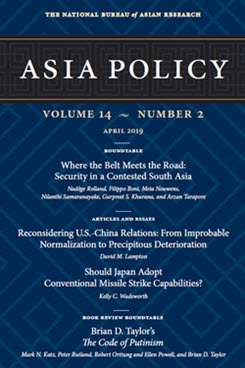Reconsidering U.S.-China Relations
From Improbable Normalization to Precipitous Deterioration
This essay examines the recent deterioration of U.S.-China relations and considers options for each country to stabilize the bilateral relationship until longer-term reforms are possible on both sides.
EXECUTIVE SUMMARY
MAIN ARGUMENT
How the U.S. and the People’s Republic of China deal with each other is the central major-power foreign policy issue of our time. The three pillars of the bilateral relationship for the last four decades (security, economics, and cultural-educational ties) have been undermined by political trends and the senior-most leaders in both societies. In the process, a revisionist narrative is taking root in both nations that the approach of “comprehensive engagement” pursued over the last 40 years was mistaken. Beyond enumerating some gains of engagement, this essay argues that the core problem in Sino-U.S. relations is that security ties are deteriorating rapidly. This deterioration, in turn, infects the other previously supportive pillars of the relationship, namely economic and educational ties. Therefore, the central need is to restore a compelling, positive security rationale for constructive bilateral ties in a very different circumstance from what existed when Richard Nixon went to China in 1972. Another major need is to introduce more reciprocity into bilateral relations so that Americans come to perceive that Beijing will cease tilting the economic, education, and media playing fields so lopsidedly in its own favor.
POLICY IMPLICATIONS
- The first principle of U.S. foreign policy since the birth of the republic has been that Washington should neither foster nor permit a circumstance in which a single power or concert of powers hostile to U.S. interests dominates the Eurasian landmass or the Pacific. The effect of current policies is to drive Russia and China together in ways adverse to U.S. interests.
- In a circumstance of growing strategic hostility between Beijing and Washington, the Taiwan issue will become increasingly difficult to handle. The U.S. Congress and administration ought to act with a high degree of caution. For its part, Beijing needs to lower the temperature by reducing coercive economic and military measures against the island.
- China must introduce greater reciprocity into all dimensions of the U.S.-China relationship. Arguing that its weaknesses or victimhood entitles it to act by different rules from others will no longer be acceptable to an American public convinced of the essential unfairness of the current relationship.
David M. Lampton is the Oksenberg-Rohlen Fellow at Stanford University’s Asia-Pacific Research Center and Hyman Professor Emeritus and former Director of China Studies at the Johns Hopkins University School of Advanced International Studies. He was the inaugural winner in 2010 of the Scalapino Prize awarded by the National Bureau of Asian Research (NBR) and the Woodrow Wilson International Center for Scholars.
About Asia Policy
Asia Policy is a peer-reviewed scholarly journal presenting policy-relevant academic research on the Asia-Pacific that draws clear and concise conclusions useful to today’s policymakers. Asia Policy is published quarterly in January, April, July, and October and accepts submissions on a rolling basis. Learn more


